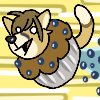
ink, then digital.
Work for an upcoming Ironclaw project.
====
Monkeys are everything expected of them; clever, devious, playful, agile, noisy, fierce, canny, social, adaptable, and whatever else comes to mind. Everything you've heard about monkeys is true - everything; if not about the monkey in question, then it's still true for a half-dozen others. They are not only capable of anything you could imagine, but somewhere, some monkey has already done it, is currently doing it, or will have it begun by the end of the day.
This is not because monkeys are particularly competent people; individually the monkey you know might seem like an incapable fool. Instead, monkeys are adept at pattern recognition and communication, particularly with each other. They also tend to feed off information and connection. It is a widely recognized that two monkeys, having just met, will lose themselves in the most banal chatter for hours, emerging from this screeching tête-à-tête with a thorough understanding of the other.
And so, what little that one monkey knows about or knows how to do, soon becomes something every other monkey met knows as well. They have no regard for personal, social, or occupational boundaries when it comes to exchanging jokes, gossip, recipes, tricks of the trade, weather tips, and other news.
This could make monkeys seem like jacks-of-all-trades, or that they always have a solution. Actually, it's not that the individual monkey is a savant genius, but that the problem at hand recalls something another monkey once said at a knitting circle, or in passing conversation waiting for a ferry, etc.
Understandably, monkeys are particularly poor confidants, and indeed they don't advance far in organized religion before betraying confessions, diluting scripture with hearsay and questioning current understanding with outside radical viewpoints. By the same token, they make excellent scholars, investigators, artisans, bards, jesters, scouts, and general assistants, improving the efficiency of any task at hand and the mood of any crowd.
In groups, monkeys exhibit social behaviour with startling emergent properties. It is said that two monkeys create annoyance, three create miracles, more than that create bloodshed.
This is because when brought together for any reason, soon after an initial period of cheerful chattering introductions, monkeys will behave as a loose, spontaneous collective, sharing information and purpose with uncanny prescience. A mob of monkeys with a common goal is unstoppable until they are divided from each other. The mob is also increasingly inscrutable as its internal culture develops in connection and complexity.
This can be a boon for the visionary with an impossible project; round up some monkeys, point them in the same direction, and step back. However, the downside is that unless they are tightly managed, monkeys will take over a project for their own aims. Many novice sea captains have fully crewed with monkeys for reasons of effective cohesion only to die in burning mutiny months later. The wise civic officer has many monkey informants, if only to keep tabs on the monkeys themselves; they breed revolution and conspiracy if left alone. After gathering them to build an engine of glory, the knowing leader then scatters those monkeys or risks eventual tragedy.
Work for an upcoming Ironclaw project.
====
Monkeys are everything expected of them; clever, devious, playful, agile, noisy, fierce, canny, social, adaptable, and whatever else comes to mind. Everything you've heard about monkeys is true - everything; if not about the monkey in question, then it's still true for a half-dozen others. They are not only capable of anything you could imagine, but somewhere, some monkey has already done it, is currently doing it, or will have it begun by the end of the day.
This is not because monkeys are particularly competent people; individually the monkey you know might seem like an incapable fool. Instead, monkeys are adept at pattern recognition and communication, particularly with each other. They also tend to feed off information and connection. It is a widely recognized that two monkeys, having just met, will lose themselves in the most banal chatter for hours, emerging from this screeching tête-à-tête with a thorough understanding of the other.
And so, what little that one monkey knows about or knows how to do, soon becomes something every other monkey met knows as well. They have no regard for personal, social, or occupational boundaries when it comes to exchanging jokes, gossip, recipes, tricks of the trade, weather tips, and other news.
This could make monkeys seem like jacks-of-all-trades, or that they always have a solution. Actually, it's not that the individual monkey is a savant genius, but that the problem at hand recalls something another monkey once said at a knitting circle, or in passing conversation waiting for a ferry, etc.
Understandably, monkeys are particularly poor confidants, and indeed they don't advance far in organized religion before betraying confessions, diluting scripture with hearsay and questioning current understanding with outside radical viewpoints. By the same token, they make excellent scholars, investigators, artisans, bards, jesters, scouts, and general assistants, improving the efficiency of any task at hand and the mood of any crowd.
In groups, monkeys exhibit social behaviour with startling emergent properties. It is said that two monkeys create annoyance, three create miracles, more than that create bloodshed.
This is because when brought together for any reason, soon after an initial period of cheerful chattering introductions, monkeys will behave as a loose, spontaneous collective, sharing information and purpose with uncanny prescience. A mob of monkeys with a common goal is unstoppable until they are divided from each other. The mob is also increasingly inscrutable as its internal culture develops in connection and complexity.
This can be a boon for the visionary with an impossible project; round up some monkeys, point them in the same direction, and step back. However, the downside is that unless they are tightly managed, monkeys will take over a project for their own aims. Many novice sea captains have fully crewed with monkeys for reasons of effective cohesion only to die in burning mutiny months later. The wise civic officer has many monkey informants, if only to keep tabs on the monkeys themselves; they breed revolution and conspiracy if left alone. After gathering them to build an engine of glory, the knowing leader then scatters those monkeys or risks eventual tragedy.
Category Artwork (Digital) / General Furry Art
Species Monkey
Size 806 x 1024px
File Size 594.3 kB
You forget that one reason they are so enmeshed is the reason that few other games are out there that cater to furry fandom as much as Iron Claw and Jade Claw. The system is not my first choice. That prize will always be the version of D&D I find most to my liking in what was done in 3.5 that was carried over to Pathfinder. But that system does not cater exclusively to furries like IC and JC which to me has a system that is a pale imitation of D&D. The idea of Iron Claw is sound. The system is not. If they are redoing things I will take a look at AC, but so far I have yet to be properly impressed with Sanguine's efforts. The fact that they use you as their exclusive artist for the majority, no matter how god you are and you are by no means someone who is a novice in his art. You I have no problems, however I will not abide an apologist for a poor system. Now granted if Sanguine is doing a new edition and taking step in a better direction I may spend money on their books again. Even my pleasure in the Bisclavet and Phelan books did not make the game as written any better. For that I adapt Pathfinder and use their rules for game play with the expectation that the world is furry. It can be done, you just have to a GM like me who is willing to make the effort to tweak what needs to be tweaked and move on.

 FA+
FA+

























Comments